Tell ’em you saw it on RoadTraveler.net
Please consider becoming a patron.
James Langan, November 2020
Copyright James Langan/RoadTraveler. All Rights Reserved
Resource:
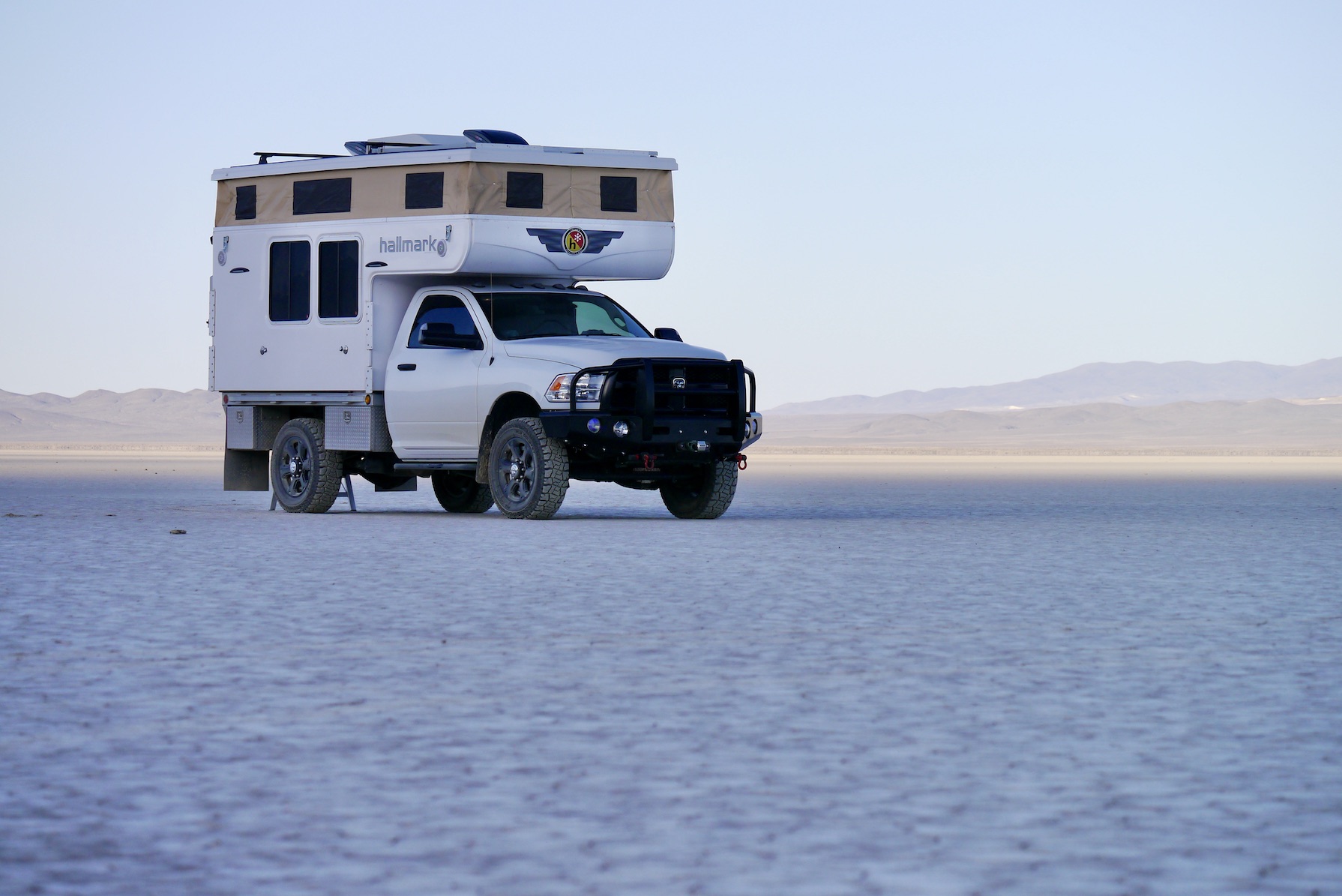
Trucks, Tech, Reviews, ADV Travel
Tell ’em you saw it on RoadTraveler.net
Please consider becoming a patron.
James Langan, November 2020
Copyright James Langan/RoadTraveler. All Rights Reserved
Resource:
I LOVE the BD TS Booster, particularly the new security feature!
I said “unstealable”, but not-drivable is more accurate.
The end of this video shows the dramatic size difference between the new TS Booster and previous version of the Throttle Sensitivity Booster.
My detailed article explaining what the Throttle Sensitivity Booster/TS Booster does and why I like it is located here: Throttle Sensitivity Booster from BD Power
More coming in additional videos.
Tell ’em you saw it on RoadTraveler.net
Please consider becoming a patron.
James Langan
Copyright James Langan/RoadTraveler. All Rights Reserved
Resources:
BD Power
800-887-5030
Geno’s Garage
Geno’s Garage: Dodge/Ram Diesel Parts Specialists
800-755-1715

BD Diesel Performance Throttle Sensitivity Booster V2
BD Diesel Performance’s Throttle Sensitivity Booster is a popular, easy to install, plug-and-play product. For folks that like to hot rod around, or do a little racing, it’s easy to understand why a Throttle Sensitivity Booster, or TSB, would be a popular item, but this product’s appeal dives deeper. Few complain about a lack of torque or power from modern turbo-diesels, although not all would judge them responsive.
Many late model Ram owners complain about accelerator pedal lag, a dead pedal. So it’s not surprising that increasing the fuel delivery for a given amount of pedal travel could eliminate a drivability complaint while simultaneously adding a perceived performance enhancement. With an automatic transmission’s fluid-coupling, there is less concern about shock-load, jumpiness, or other potentially negative drivability behaviors emanating from increasing the sensitivity. However, on manual transmission trucks, might boosting the accelerator impact driver finesse and vehicle sympathy?
Skeptic Turned Into A Fan?
Do I want a more sensitive accelerator? My answer had been no. As I have shared in past columns, my additional pedal return springs and take-up slack spacer do much to improve the feel, feedback, and drivability of my rigs. I am extremely satisfied with these home brew modifications. So what spurred me to try the second version of BD’s TSB?

An acquaintance with a 2014 crew cab 3500 with automatic transmission let me drive his Ram, to judge what the 3500 leaf springs feel like unloaded. (I don’t know what some are complaining about, must be car people, it wasn’t too stiff or firm with appropriate tire pressure.) His truck had been deleted before he purchased it used, sported a mild fueling tune, and a BD Throttle Sensitivity Booster. His rig really scooted with little pressure on the go-pedal.
Some of that energetic behavior was from the automatic transmission, which goes and never stops until you release the skinny pedal. There is no loss of momentum during upshifts like occur with a manual, combined with a higher-rated A/T engine and the performance tune. Though it was also clear that the 3500 was really moving with a small dip into the accelerator. This experience made me rethink trying a BD TSB on one of my outfits.
Slow To Start And Occasionally A Jerk
My Fourth Generation 2500 G56 Rams have been great, complaints have been few, but there has been a minor irritation: a light throttle surging or hesitation. This behavior is not uncommon on modern drive-by-wire vehicles (cars, trucks, and motorcycles), particularly if fuel metering is held at the exact spot between some, and none. However, the hesitation my 2500s exhibited didn’t occur only at that sour spot, rather a little deeper into the pedal. Fuel delivery would sometimes pulse with a steady but small accelerator application of approximately 10–20% of total travel. It was also slow to respond to input changes.
The choppiness could be reduced or eliminated with a deeper, more aggressive pedal application, but that is not always desirable or safe. More precise and consistent response from all inputs is better for optimal control, smoothness, and fuel economy.
After some online research I called BD to confirm what I’d read. The second version of the BD TSB has three different positions: stock, 50% increase, and 100% increase. The control module must be opened to select the different sensitivities, and the boxes are typically under or behind the dash.
If the optional button kit is ordered, you get three additional choices: a valet mode that reduces pedal sensitivity substantially, a 75% setting, and a “ludicrous” mode, all of which are easily selected with the press of a dash-mounted button. Ludicrous held no appeal, but I was interested in having the 75% setting, plus the easy ability to revert to stock for bumpy off-road situations. With the exception of the ludicrous position, the BD TSB remains in its current mode after an engine shut-down and restart.


Geno’s Garage sold the BD TSB Version 2 for $285, and the optional Push Button Kit was $65. The just introduced TS Booster V3 is even less; $265 at Geno’s for 2007–2020 Rams.
In 2019, BD received California Air Resources Board (CARB) Executive Order (EO) approval for their TSB for 2005–2018 heavy-duty Ford diesel applications, and was working on approval for the Dodge/Ram and GM products. That is a big deal!
Install Notes And Tips
According to BD Diesel, if one is going to run their TSB in conjunction with the BD High Idle Kit (which I have on my 2014 crew cab) one needs to put the Sensitivity Booster on the pedal side, and the High Idle on the truck side of the wiring chain. That’s because if the signal coming out of the High Idle Kit is sent through the TSB first, before going to the ECM, the High Idle module will have a harder time controlling the rpm (just like a person might with a more sensitive accelerator pedal). However, stacking them the other way around, letting the High Idle Kit communicate directly with the ECM, does not adversely affect operation of either accessory.

The installation is a very simple. If one chooses the optional Button Kit, it must be connected to the main TSB wiring harness. The short and adequate instructions tell how, and my closeup images show some details. After following a brief pedal-learning procedure, one simply needs to mount the control box and button where desired and continue motoring.




Drivability
Does the lowest, 50% sensitivity increase make the truck feel like it has more power? Absolutely! The perception is that the truck has a higher-power rating, like the maximum fuel delivery has been increased though it has not. Nothing mechanical has changed, the driver is simply getting more juice from the same squeeze. There’s no need to push the skinny pedal unnaturally deep to get moderate or brisk acceleration. If you want more than the 50% setting offers, the optional button puts 75% and 100% at your fingertips. The difference between each position is dramatic. To experience this, one can keep constant pressure on the pedal while toggling from stock up through the higher sensitivity levels; it will make the truck accelerate quicker.


With the lively 50% boost, smooth and precise application of fuel is not difficult. Even the 75% position is fun and controllable with a manual transmission, though my extra return springs and much firmer pedal are surely helping. I’ve mostly preferred 50% when routinely rowing through the gears. The aforementioned light pedal stutter/hesitation is all but gone.
Initially I connected the BD TSB to Clessie the Carryall Crew Cab. After a few days of testing, I moved it to the Pack Mule regular cab camper outfit. I liked it on both, maybe a bit more in the ‘Mule because of the full-time GVWR load. It really helps the truck accelerate as if it has more toque and power. After the first weeklong road, hunting and camping trip to Eastern Nevada, I knew the BD Throttle Sensitivity Booster was a winner; I ordered a second for Clessie the Carryall. That was several months ago, and I’m still pleased with the modification on both Rams.
Tell ’em you saw it on RoadTraveler.net
Become a RoadTraveler patron. Thanks!
James Langan
Copyright James Langan/RoadTraveler. All Rights Reserved
Resources:
BD Diesel Performance
800-887-5030
Geno’s Garage
Geno’s Garage: Dodge/Ram Diesel Parts Specialists
800-755-1715
James Langan
Copyright James Langan/RoadTraveler All Rights Reserved
Resource: BD Diesel Performance

Moving Slower
Reversing and maneuvering large trucks, trailers, or other big outfits can be challenging and even stressful for those lacking skill or confidence. One way to mitigate the reduced visibility and risk of hitting something and causing property damage, or worse, is to move slowly. This is obvious to most everyone, yet the slowest transmission gears, first and reverse, are still tall for creeping around campsites, parking lots, and other narrow spaces. Adding grades and/or tight turns can increase the gearing deficiency. Excessive slipping of a clutch or loading of a torque converter is not a perfect solution, but sometimes a necessary evil. Done improperly with too much rpm, or repeatedly, wear or a mechanical failure may be the eventual reward.
Transfer Case Auxiliary Gearboxes
Four-wheel-drive (4WD) trucks have become extremely popular in recent decades, even with folks that rarely, if ever, venture off-pavement. The low gearing in most transfer cases lives a very lonely life. The point of low-range is to go slow in technical situations, with the added benefit (or impediment) of powering the front tires. Using low-range increases torque and helps the engine move loads at slower speeds, even at low idle. Some savvy and careful drivers will shift into 4WD-low to access the gears for backing and maneuvering, but this is not without consequence.
Traditional part-time transfer cases split engine torque equally between the front and rear axles and are designed for slippery surfaces. A slipping tire can release the inherent bind that occurs at the transfer case between the front and rear shafts. When used on high-traction surfaces that don’t allow dissipation, there is a possibility of drivetrain damage, though the risk is small if the steered tires remain straight and distances are short. Once the front tires are turned, which dramatically increases the need for differential action, drivetrain windup will result. This energy is transmitted to and felt in the steering wheel, which will move or jerk in the driver’s hands as the drivelines complain. (Full-time 4WD systems use a center differential, avoiding the conflict between the front and rear drive systems.)
Two-Wheel-Drive Low
When most 4WDs had manual-locking front hubs, simply keeping the hubs in their normal, unlocked position allowed shifting into low range without connecting the front wheels to the axles. This works, and I did it for decades. Drivers should be careful and smooth because all of the engine’s torque, now multiplied by the transfer-case gears, is going to only one driveshaft, not two.
Manual hubs on Dodge Turbo Diesels disappeared with the First Generation in 1993. Second Generation trucks have a vacuum-operated front axle disconnect system that allows a relatively simple bypass to use low-range 2WD. BD Diesel Performance still makes a kit for these Second Generation Dodge trucks. After Dodge eliminated the disconnect system in favor of constantly driving the front axles, no simple solution existed; the only real option was to add manual hubs. With the return of front axle disconnect on heavy-duty Rams in 2013, now electrically-activated, preventing 4WD from engaging while accessing the low-range gears is again easy.
DISCLAIMER—As always, use extreme care and (un)common sense. Operate all machinery with due care, while also accepting the inherent responsibility that comes with any modification. You may be your own warranty station.
2 Low UnLoc
Spring 2017, BD Diesel Performance introduced their two-wheel-drive low solution, the 2 Low UnLoc kit for 4WD 2009–2017 1500, 2014–2017 2500, and 2013–2017 3500 Rams. BD sent me one of the first units.
One end of the harness has two OEM-quality connectors that go inline at the Drivetrain Control Module, another has ports for the two included relays, and a third connects to the supplied switch. My friend Phil and I installed the kit on his 2014 2500 with 35,000 miles on the clock. He tows a 24-foot travel trailer.

It’s So Easy
The 2 Low UnLoc for late-model axle disconnect trucks is a simple add-on. BD’s directions were followed almost to-the-letter because I found no way or need to improve the process. The one slight deviance was drilling the switch hole.
Removing three push-in retainers for the carpeted panel below the glove box allows pulling the carpet rearward, which exposes the drivetrain control module. Unclipping the black plastic cover exposes the blue factory male connector that is replaced with BD’s. The OE male plug snaps into BD’s female connector. Re-clipping the drivetrain control module cover was only a minor struggle with the extra BD connector inside.
There is plenty of harness to locate the relays far from the drivetrain control module if desired, but we secured them below module with mounting tape. The last thing to do was to make a hole for the switch.
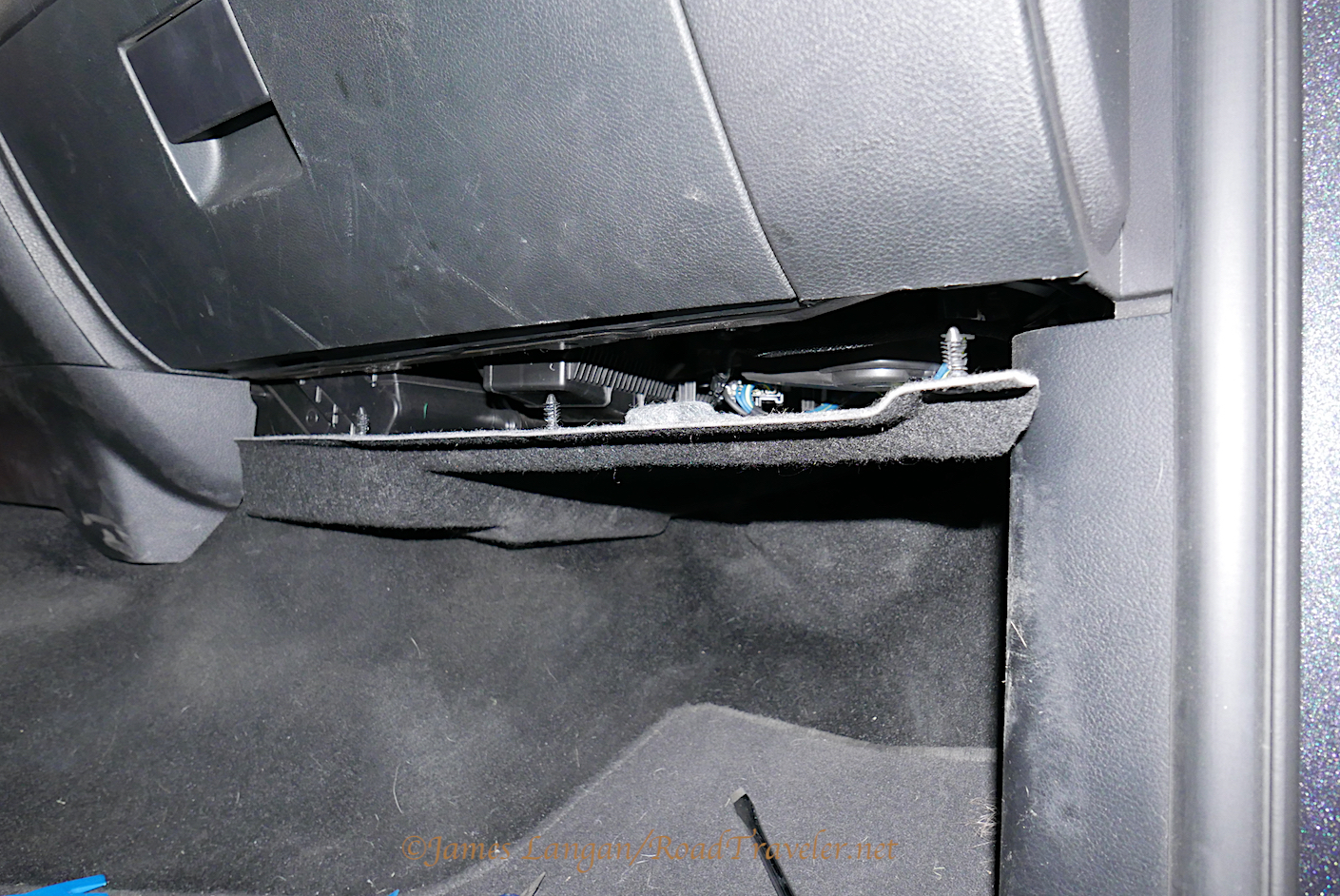
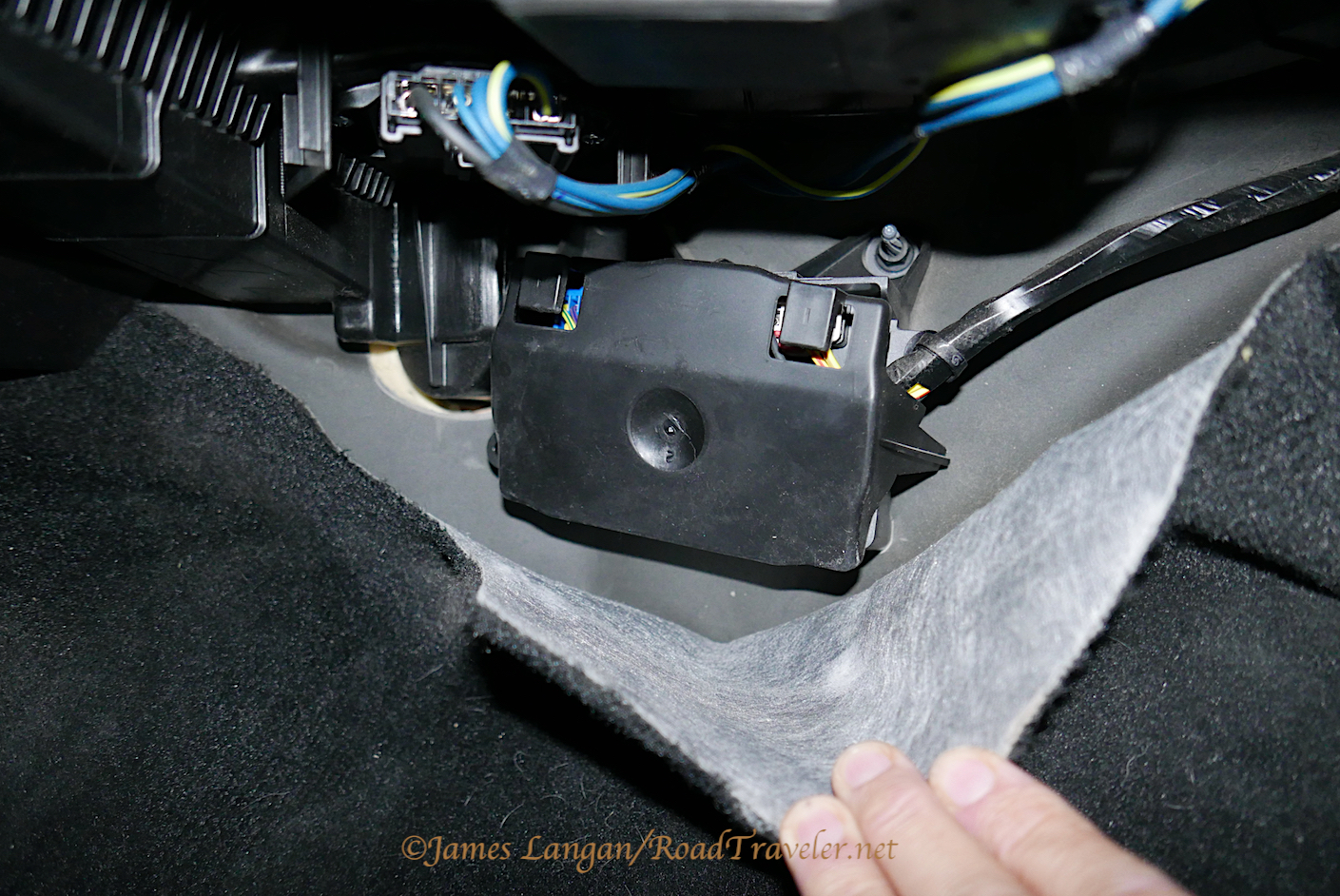
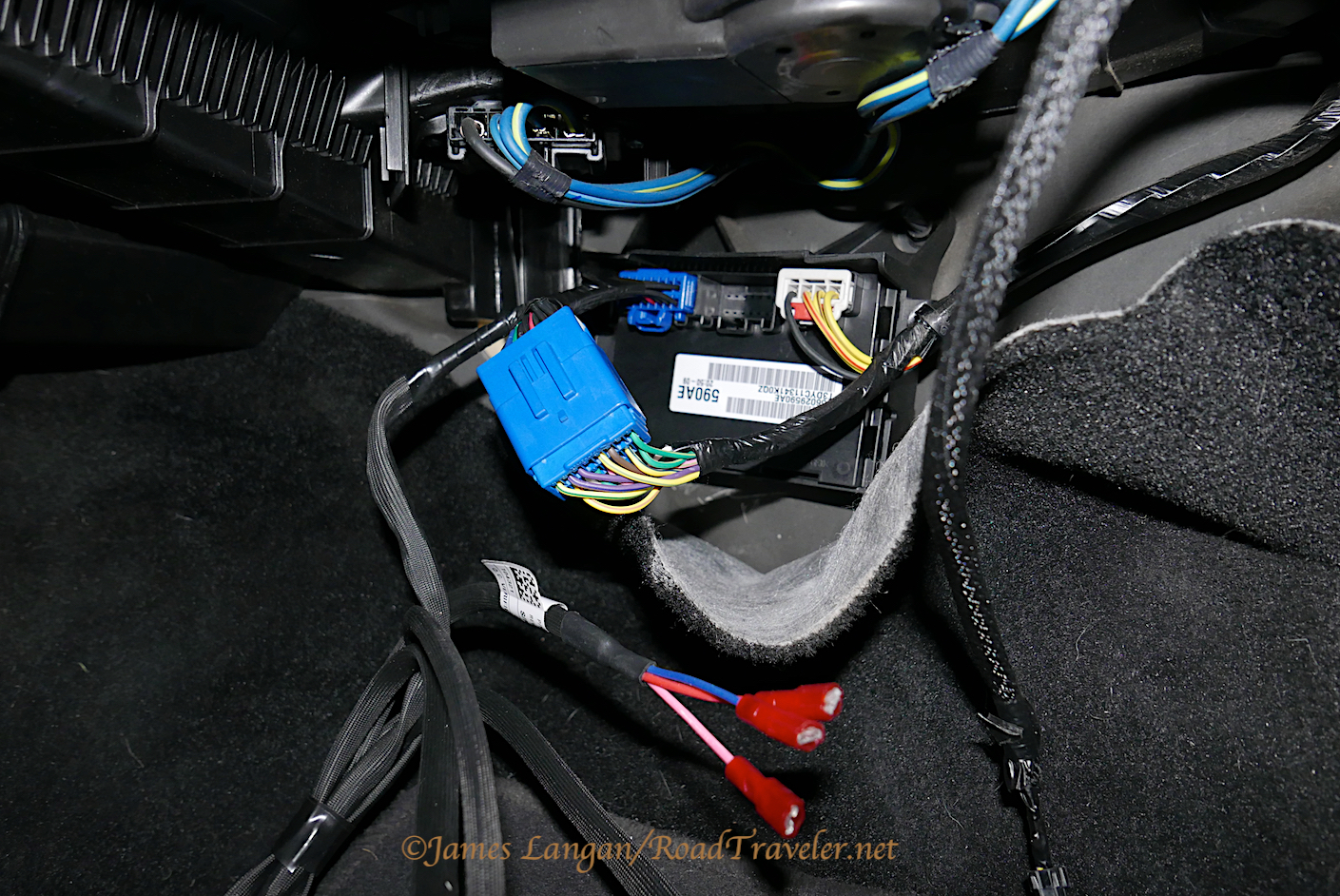
Pulling The Center Stack Cover
Removing the center dash cover that surrounds the radio and HVAC control is a simple task, though like doing anything for the first time there can be trepidation. The first step is the most critical and can be easily overlooked by the uninitiated.
A plastic liner snaps into the tray above the radio and must be removed to expose two TORX T20 screws. Remove these two screws first and replace last. The remainder of the piece is held with several snap-in clips, mostly around the perimeter, and it is simply pulled away at the edges. I use my fingertips and/or a plastic interior trim tool. After the surround is loose, a few connectors on the rear must be unclipped before the piece can be completely removed.
Drilling
Phil and I started this 2 Low UnLoc project by removing the dash center stack cover, which confirmed we could use the blank spot below the cubby on the right. From the front it appeared that the matching blank space on the left could be used instead. This was not the case on Phil’s truck, as there was a connector on the back. These little panels are great locations for switches, plus they are replaceable, secured with four Philips screws on the rear.
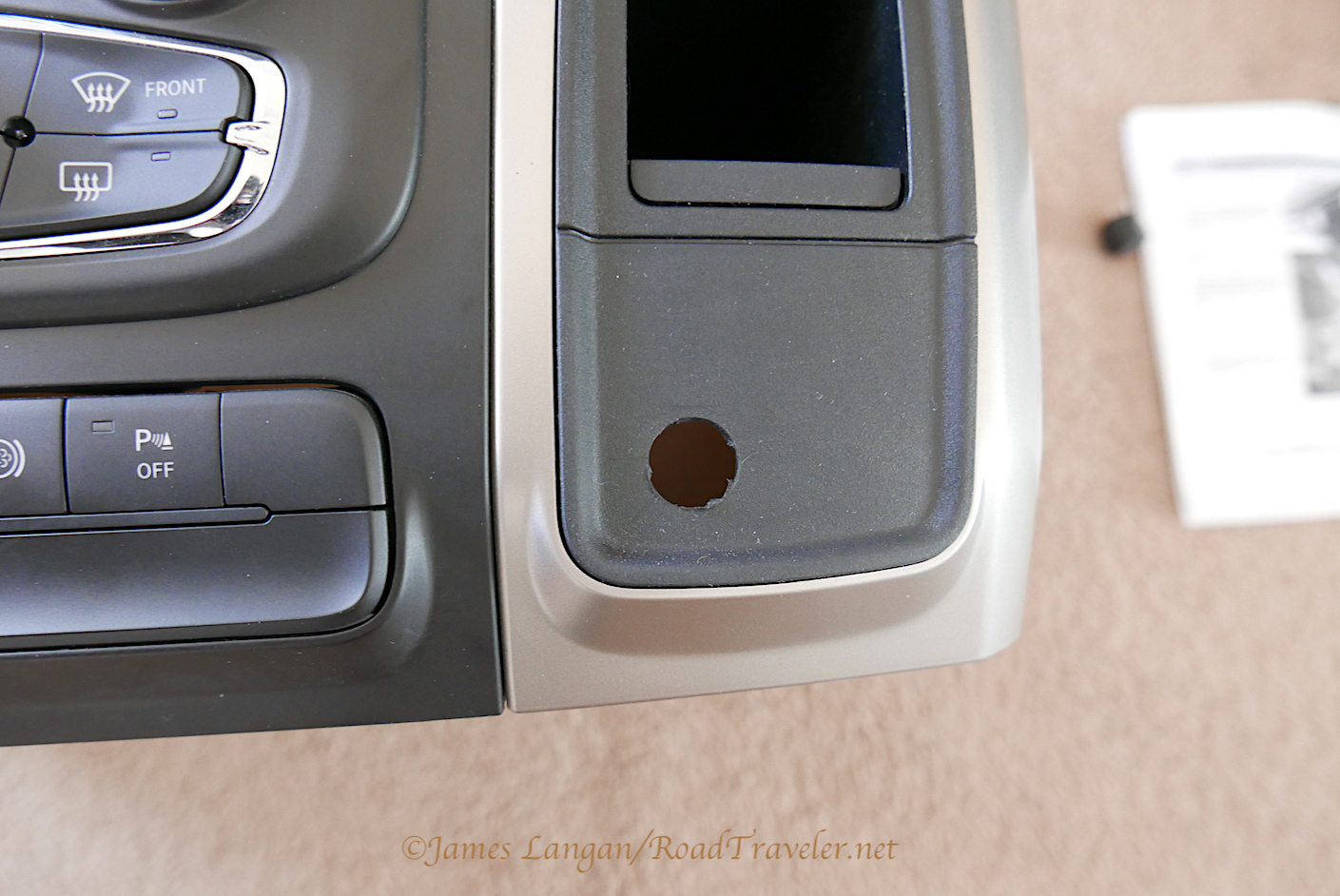
BD recommends using a stepper drill bit to make the hole for their lighted rocker switch. I don’t own a stepper bit, but I would have been concerned about going too deep and making the hole too big. The largest bit in my toolbox is a 5/8”. After stepping up to this size we were close, but the hole was still slightly undersized. Carefully enlarging the hole with the same 5/8” bit worked; I stopped while the rocker was still a very tight, interference fit. A small file was used to cut a notch for the locating tab on the left side. Because of the snug fit, we were unable to use the 2WD LOW sticker BD provides with the kit.
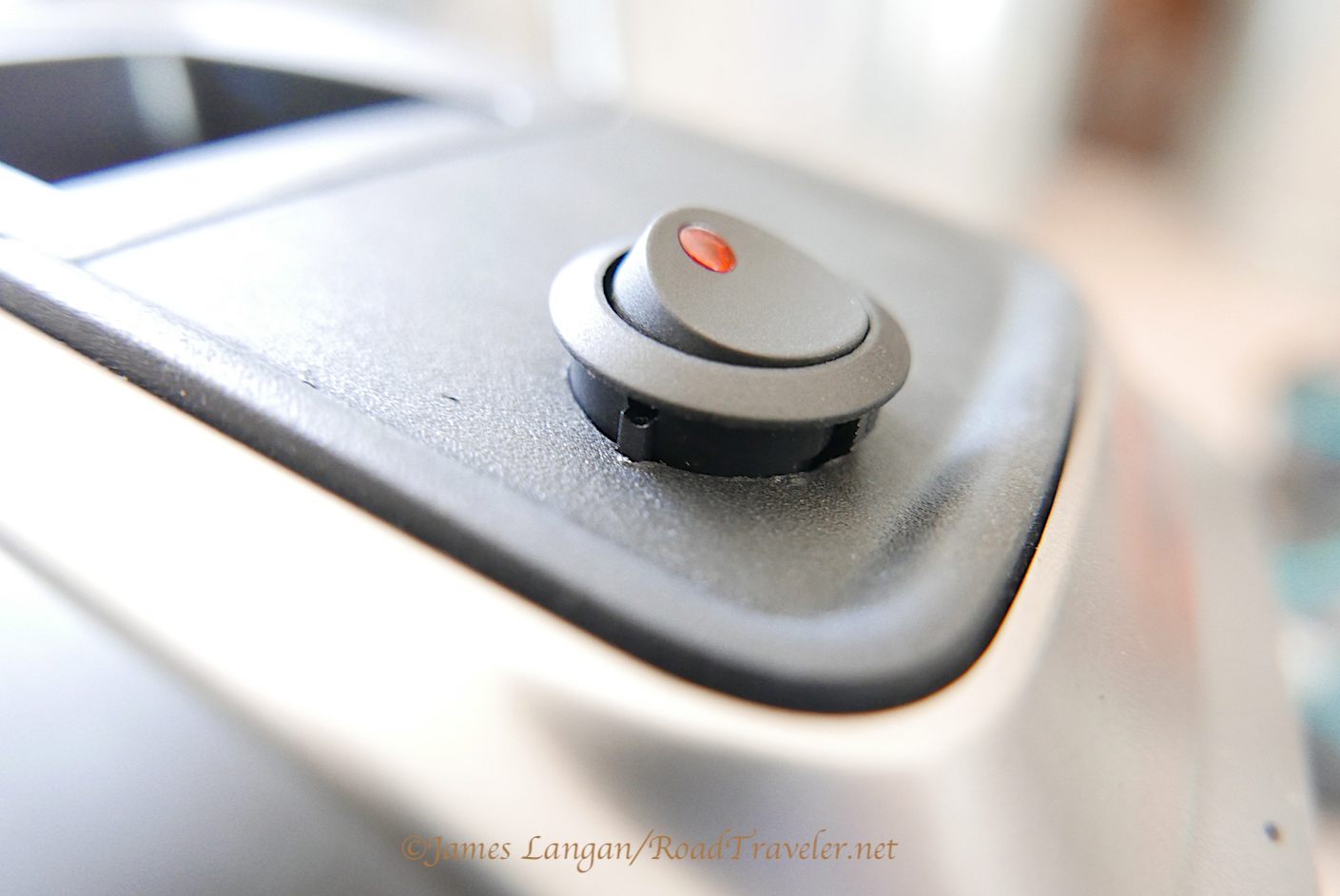
Function Testing
Before pushing the rocker switch into its tight, final resting place we loosely connected the three color-coded wires and tested the 2 Low UnLoc system. The operating procedure requires rotating the rocker switch to the on position first, then moving the transfer case selector or lever to low-range. The red light on the rocker will illuminate, indicating that front axle engagement has been bypassed, and BD’s 2 Low UnLoc is active. To deactivate, the sequence is reversed; the transfer case is shifted back to two-wheel-drive high-range, then the switch is turned off.
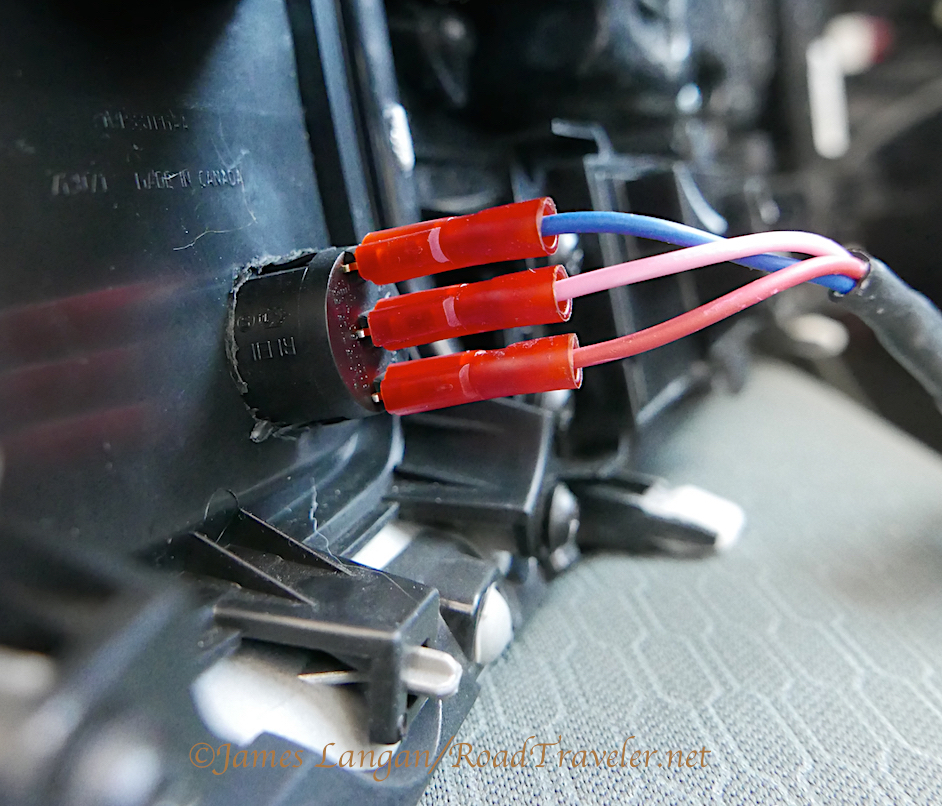

We reassembled everything and tested the feature again. It worked. Phil and I both love the BD 2 Low UnLoc and think the $148 price is worth the functionality and ease of installation. Geno’s Garage stocks the 2 Low UnLoc kit, and reports they have been selling well.
James Langan
Copyright James Langan/RoadTraveler/Turbo Diesel Register. All Rights Reserved.
A version of this article was also published in the Turbo Diesel Register magazine.
Sources:
BD Diesel Performance: dieselperformance.com, 800-887-5030
Geno’s Garage: genosgarage.com, 800-755-1715
This 2016 SEMA Show post is centered around diesel pickups, and towing and hauling. Originally written for and published in my Still Plays With Trucks column, for the Turbo Diesel Register magazine.
The publisher of the Turbo Diesel Register suggested that I gauge enthusiasm for the new 2017 Ford Super Duty trucks based on how many were used for SEMA projects. There were certainly several new Super Dutys prominently displayed and flying Ford colors at various booths. One of my favorites was Mickey Thompson’s Tall Boy, created by X-Treme Toyz, which had a 6.2L gas V8 under the hood instead of a Power Stroke Diesel. As big and bad as the Tall Boy is, it is tastefully moderate compared to many of the ridiculous and all-show-but-no-go trucks. But that is SEMA, and I’m guilty of being too practical. Sporting Mickey Thompson’s new 20” Sidebiter wheels and 40” Baja MTZ P3 tires, the front bumper and grille treatment tastefully subdued Ford’s huge and blinding factory pieces. mickeythompsontires.com
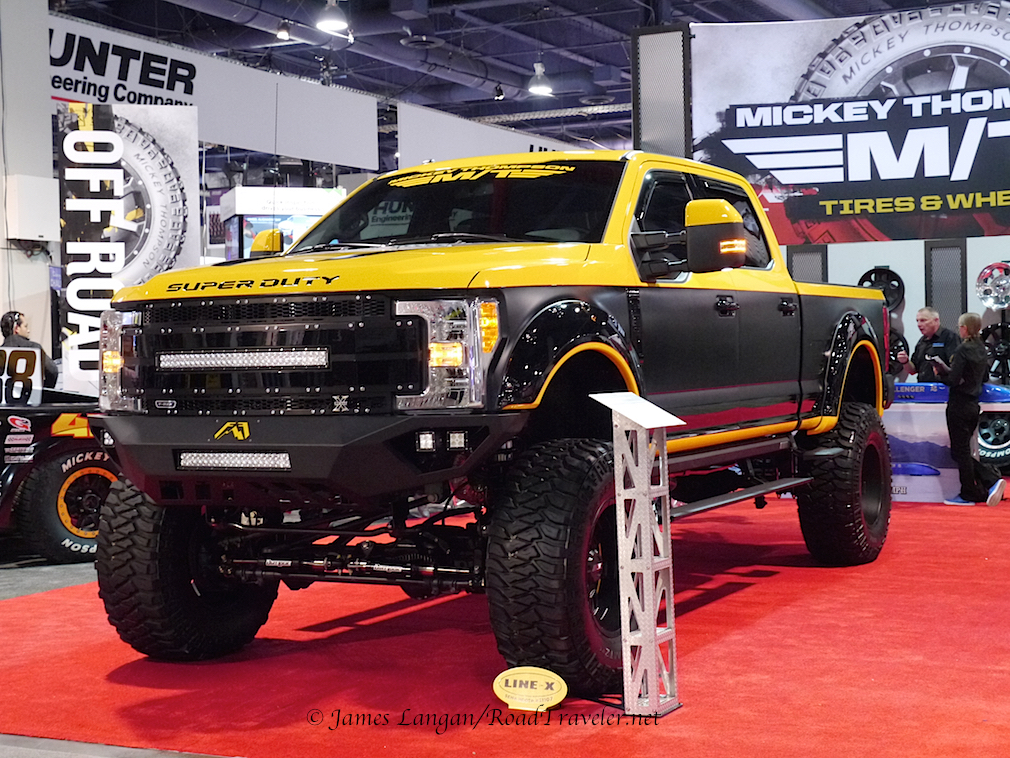
Noting a few new Fords was fine, but my personal bias favors the Ram/Cummins combination. Despite 18-years of Ford Power Stroke ownership (a good-old 7.3L) I never loved the sound of the rattling V8 compared to the inline-6 tractor music of the Cummins ISB. Even in its quieter modern form, there is simply no comparison. Despite the race to upstage each other with the highest power, torque, and/or tow rating numbers, the venerable inline-6 still delivers, admittedly with less horsepower, as an inline-6 doesn’t like to rev like the V8s. However, personal biases aside, all the heavy-duty diesel pickups offered in North America these days are insanely capable and cool. Pick one. For my 2016 SEMA Show assignment for Turbo Diesel Register, I focused on some of the new stuff, some of it Ram-specific, and the remainder good for most any truck.
New for the 2007.5 to 2016 6.7L Cummins is the BD HE351VE Screamer Turbo, which offers:
-Drop-in replacement for the factory turbo; no downpipe or air intake mods required
-New Ballistic 64.5mm 7+7 blade compressor wheel, and new 70mm 12-blade turbine
-Exclusive BD turbine profile to reduce back pressure and increase turbine flow
-Supports up to 690 HP
-Lower EGT
-NEW Holset VGT actuator
BD’s Brian Roth explained that one of the problems observed with the 6.7L engine is high exhaust temperatures and high-drive pressures (the amount of pressure it takes to drive the turbo—or resistance), even on stock trucks without increased fuel delivery. This drop-in replacement turbocharger was designed to address these issues, while supporting 90HP injectors and a tuner set on “extreme”, delivering up to 690 horsepower.
It’s noteworthy that BD includes a new control module atop these turbos, which is important because it’s one of the more failure-prone components, even on the OE turbos according to Brian. He cautioned that often rebuilt turbochargers employ used electronics of unknown reliability. This isn’t surprising because the controllers are about $1,400, but BD focuses on quality and reliability and doesn’t want worn electronics on their new turbo. The MSRP for the new Screamer Turbo is $3,000, and the very good factory exhaust brake button on the newer trucks will still work.
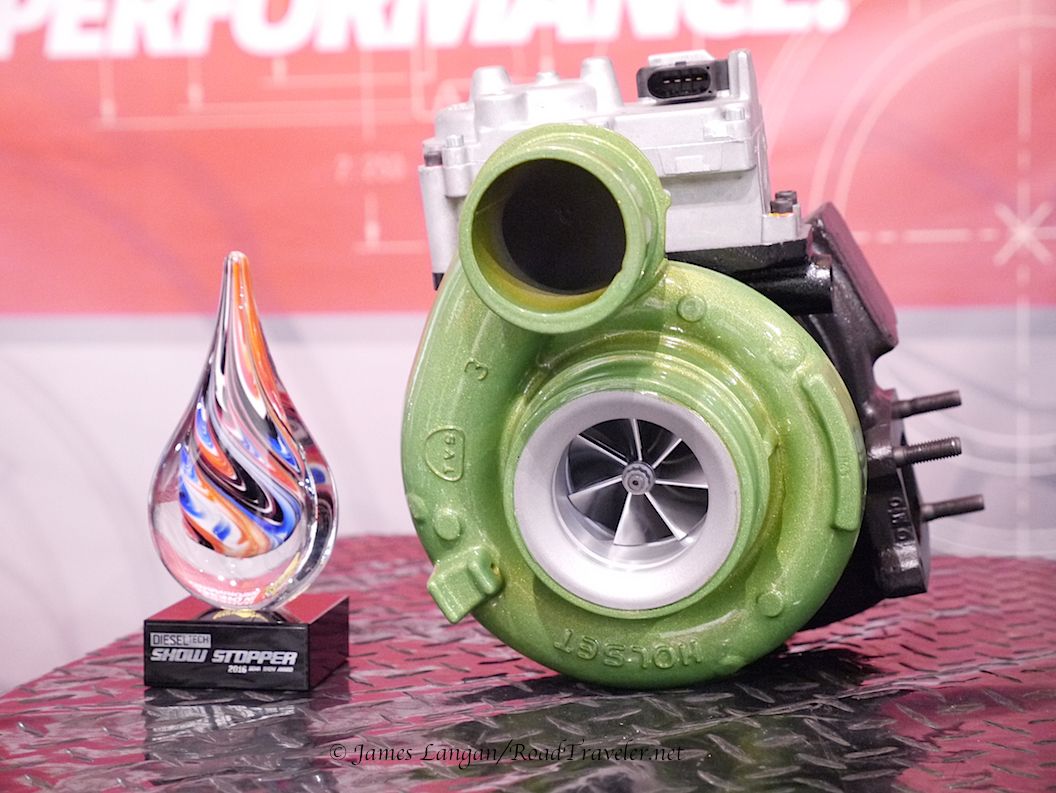
Fewer performance products have been available for late-models trucks, partially because of increased emissions testing and enforcement, which helps make this bolt-on product even more significant. Of course, it takes extra fuel to make more power and torque, so the Screamer is intended to complement fuel-delivery modifications. Diesel Tech Magazine liked the Screamer Turbo enough to award BD one of their top five “Show Stopper” awards.
BD Dana 70 Diff Cover
There is no denying that high-capacity, replacement aluminum differential covers are functional, sharp, and come with none of the possible compromises associated with some high-performance modifications. This new BD cover is for 1981 to 2002 Dodge trucks, and features:
-Baffled design to keep the oil on the gears
-Extra oil capacity
-Internal and external cooling fins
-Stainless-steel Allen cap screws and fill plug
-Magnetic drain plug
-Gasket-less, reusable O-ring-sealed cover
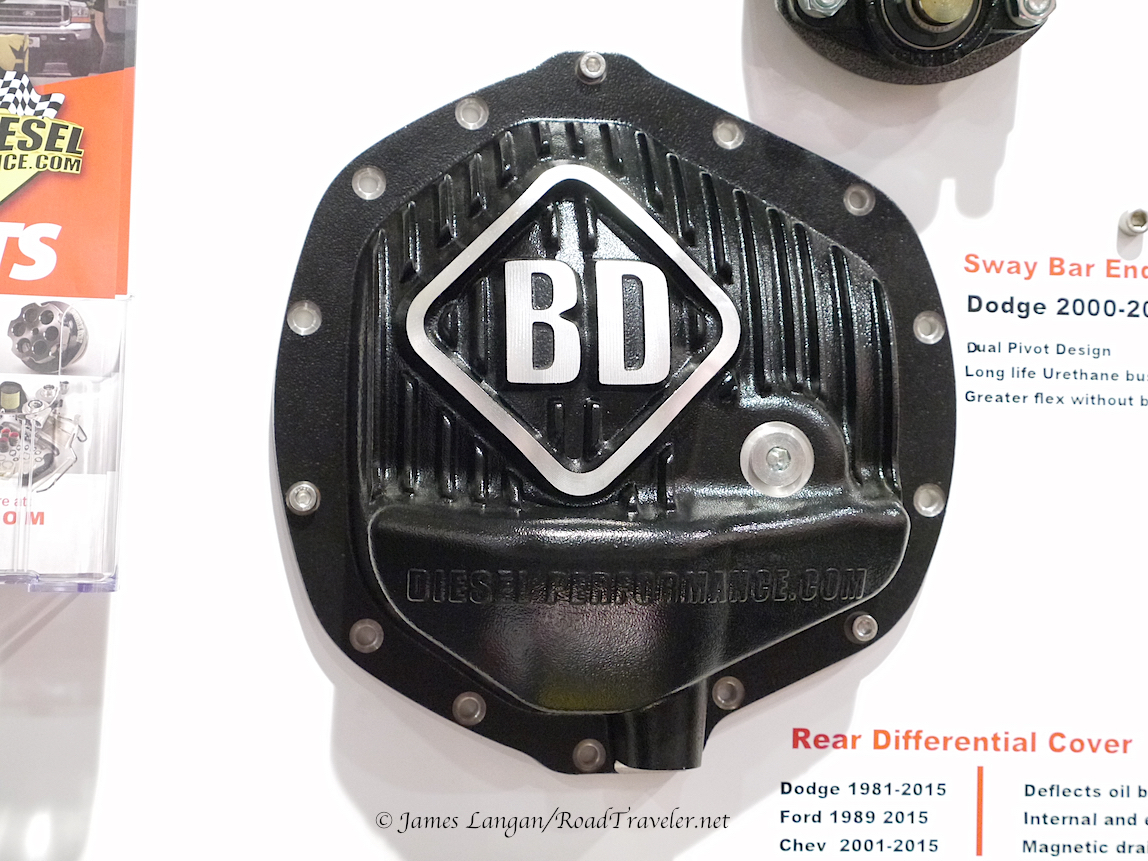
Patriot Plug
The aftermarket’s response demonstrates that many enthusiasts are not comfortable with the capless fuel filler on new Ram diesels. BD joins the fray with their anodized billet aluminum filler cap. It has a magnetized base, a bottle-opener feature, and a gun-cylinder-styled handle that accepts spent 9mm shells. dieselperformance.com
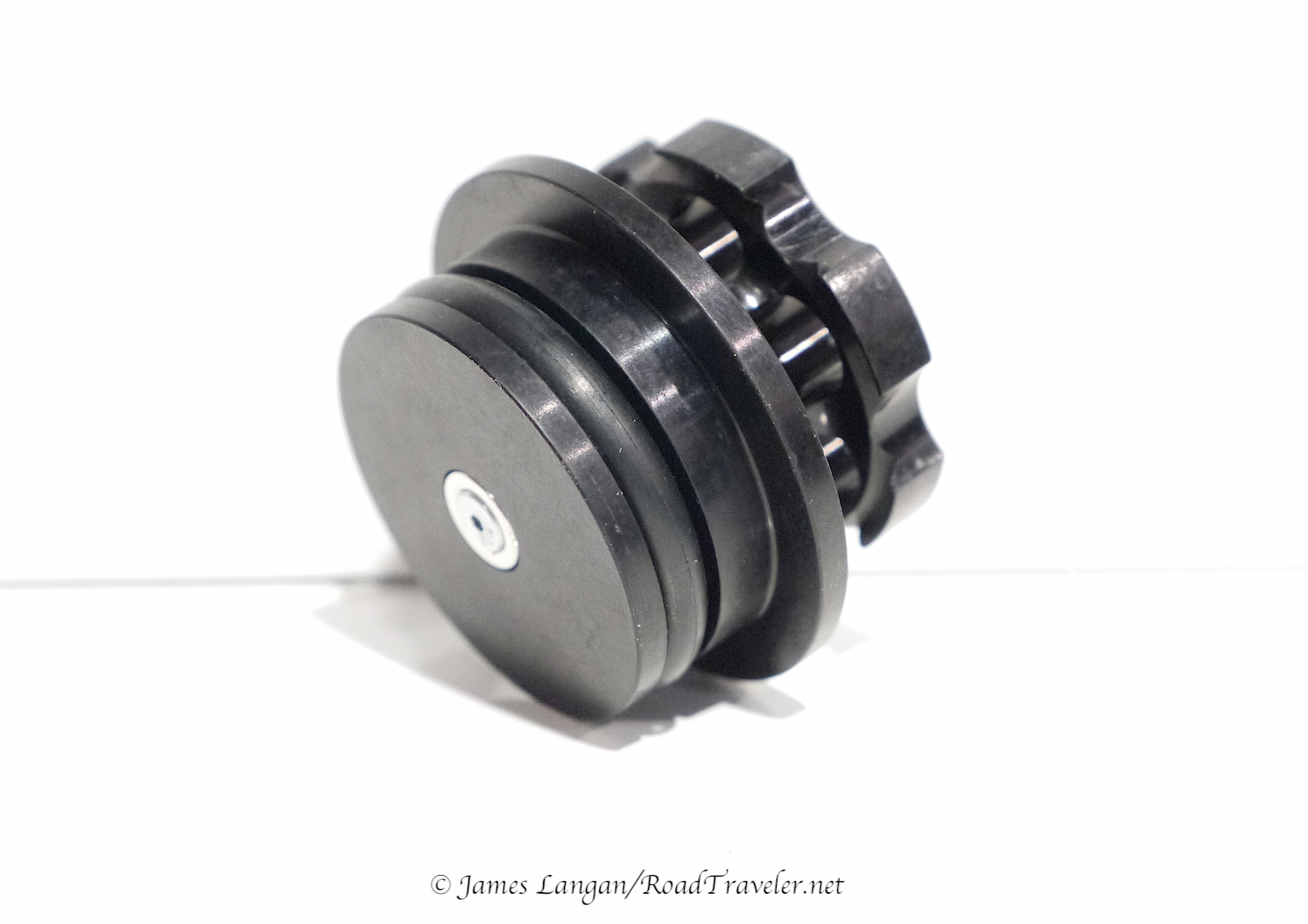
TDR readers know from my TDR93 SPWT column that I love BOLT’s ignition-key locks. (BOLT Lock review on RoadTraveler) Their new Off Vehicle Coupler Lock makes it virtually impossible for someone to hookup and move your trailer. I hope to give this piece more attention in an upcoming article. boltlock.com
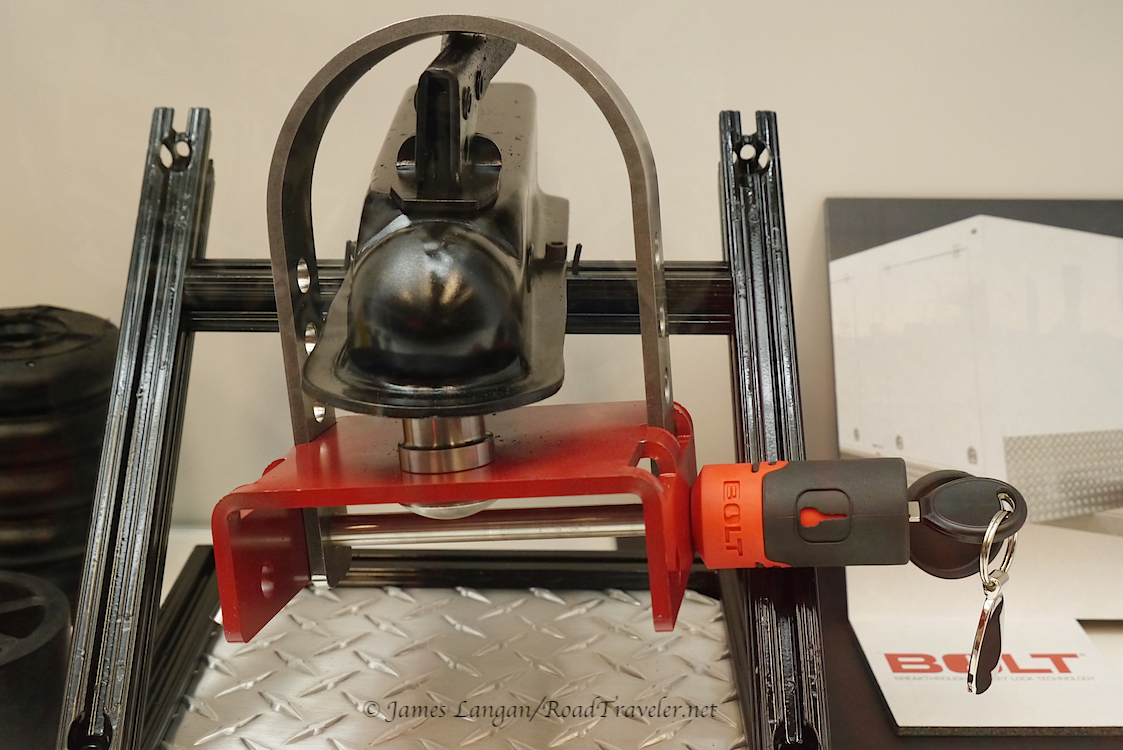
The A25 fifth-wheel hitch from Curt includes:
-25,000 pound rated fifth-wheel hitch (20k was the largest before), designed to work with the factory Ram fifth-wheel prep option
-360-degree locking jaws
-Release lever that rotates in an arc around the pivot pin, instead of pulling straight out
-Patented yoke system under the head provides 10-degrees of movement in all directions
-Auto resetting jaws allow coupling without a manual reset
-Green, yellow, red coupler condition indicator
TruTrack 15k weight distribution system for 2” shank receivers:
Building on the existing TruTrack system that integrates sway-control into the weight-distribution hitch, Curt revealed a new 15,000-pound version. Trailers and ratings continue to climb, but not everyone wants a 2.5” receiver, preferring to keep their 2” hitch.
Curt is still a U.S. manufacturer of truck accessories, making their products in Eau Claire, Wisconsin. curtmfg.com
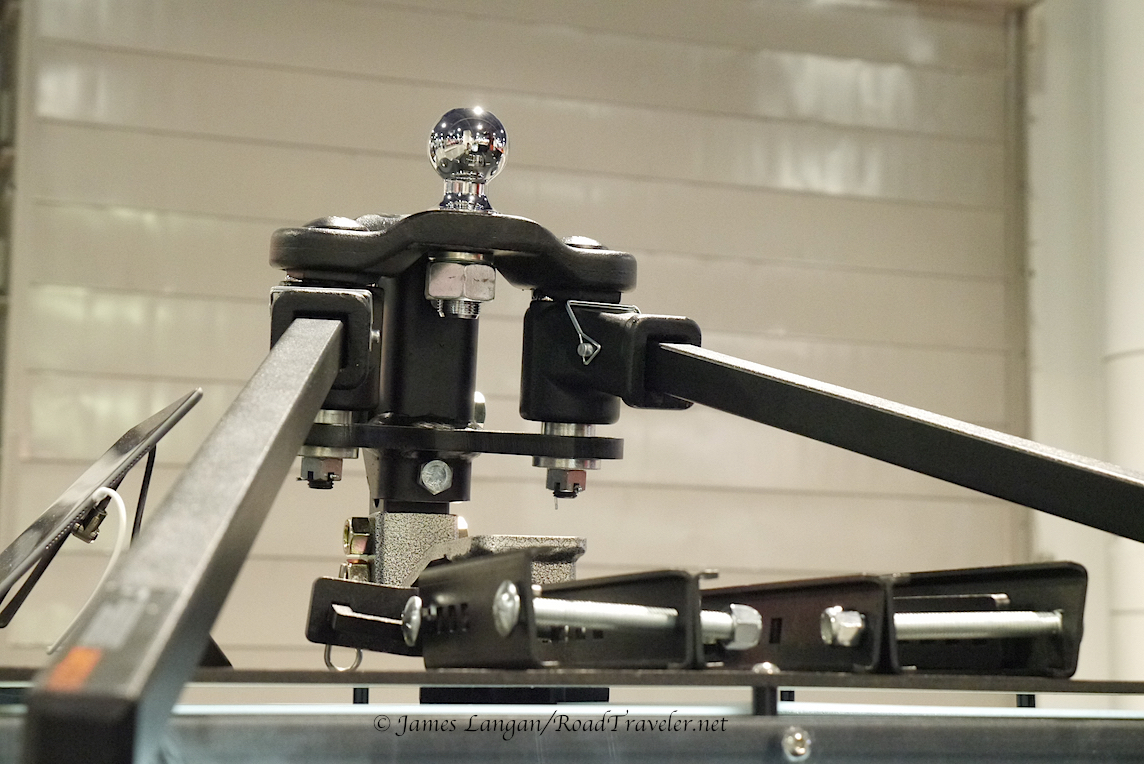
Designed for owners of heavy-duty pickups, the new LoadLifter 7500 series provides up to 7,500-pounds of load-leveling capacity for towing heavy gooseneck and fifth-wheel trailers or hauling big slide-in campers. The 7” bellows were engineered for maximum loads, but like most air springs they can be run anywhere between 5 and 100 psi. airliftcompany.com
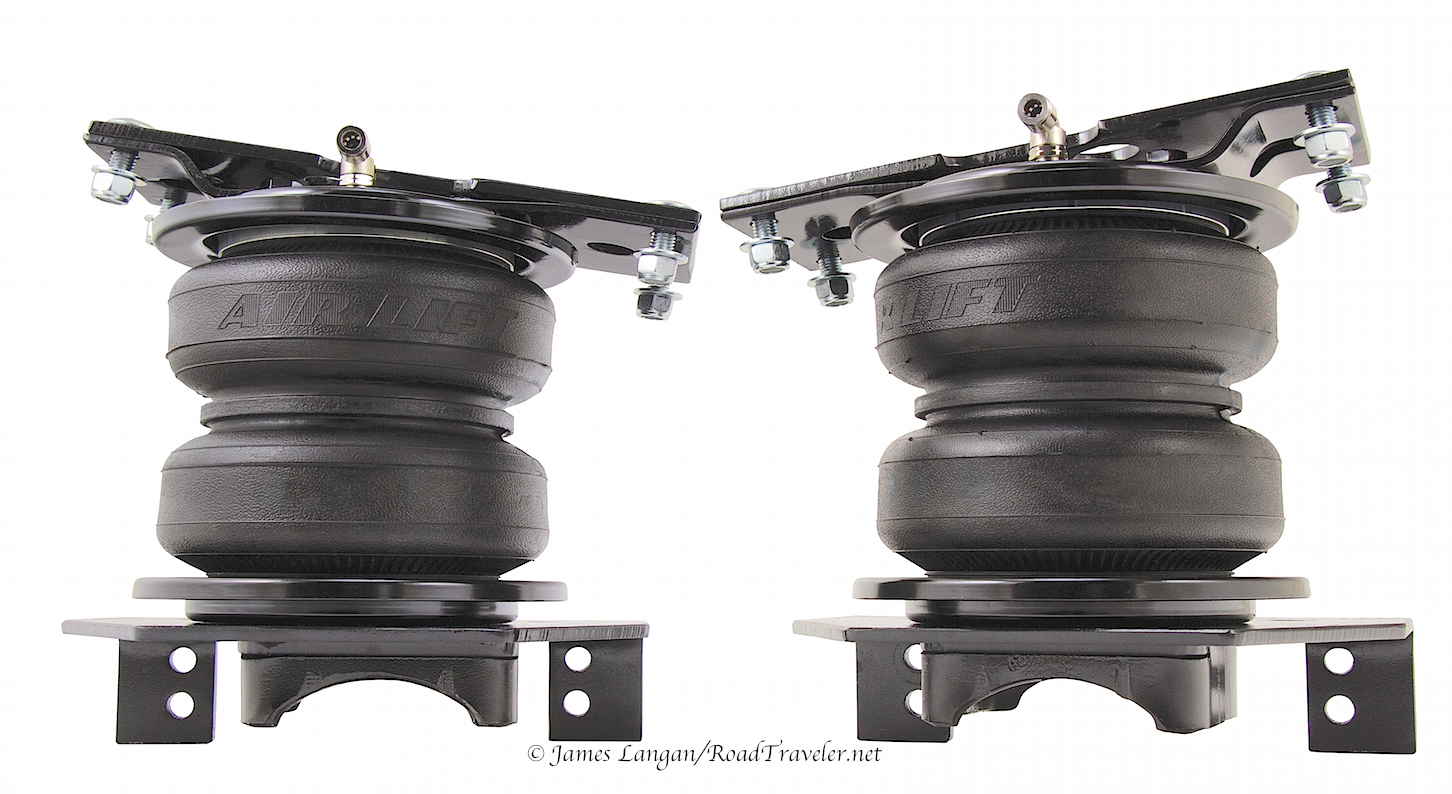
Are you concerned about flat spots and the overall health of your trailer tires as they sit motionless for months during the off-season? Pulling onto Trailer Legs rotates them into position and lifts your trailer axles, allowing the tires to rest without supporting the weight of the trailer. Each stand is rated to hold two tons, or 8,000 pounds per axle. trailerlegs.com
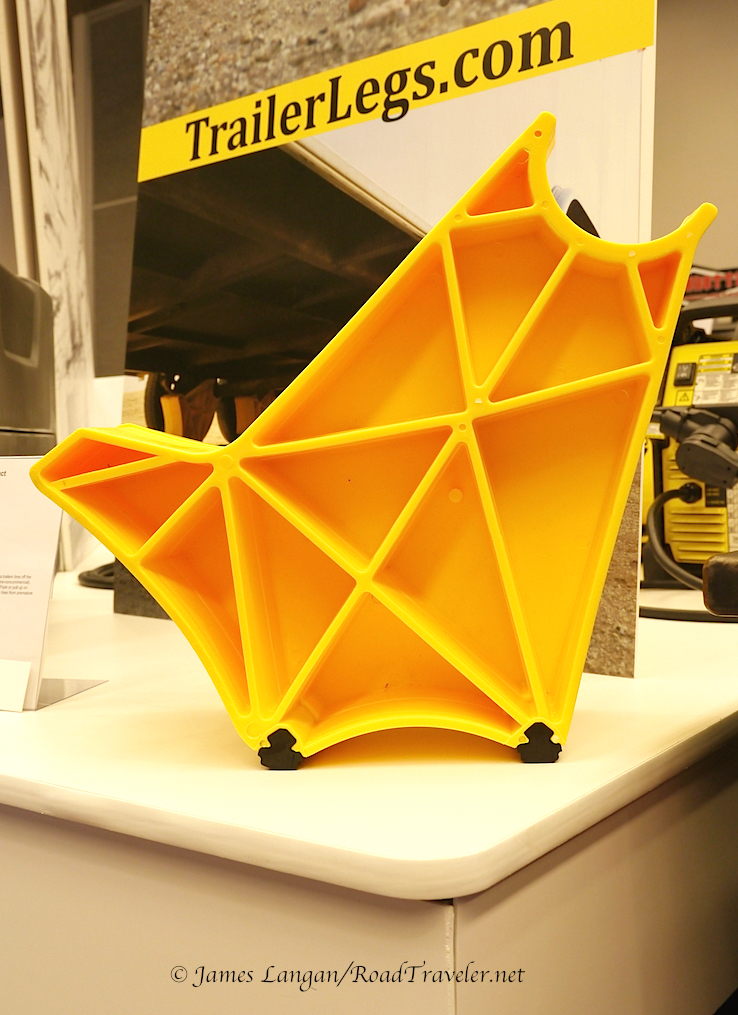
This 40-Gallon in-bed auxiliary fuel tank system for 1999 to 2017 Ram trucks is available for both long and short bed pickups. It is designed to fit the newer pickups that come equipped with OEM fifth-wheel pucks in the bed. The tank will also work in RamBox trucks. As with all Transfer Flow tanks, it’s made from 14-gauge aluminized steel, with internal baffles, in Chico, California, USA. transferflow.com
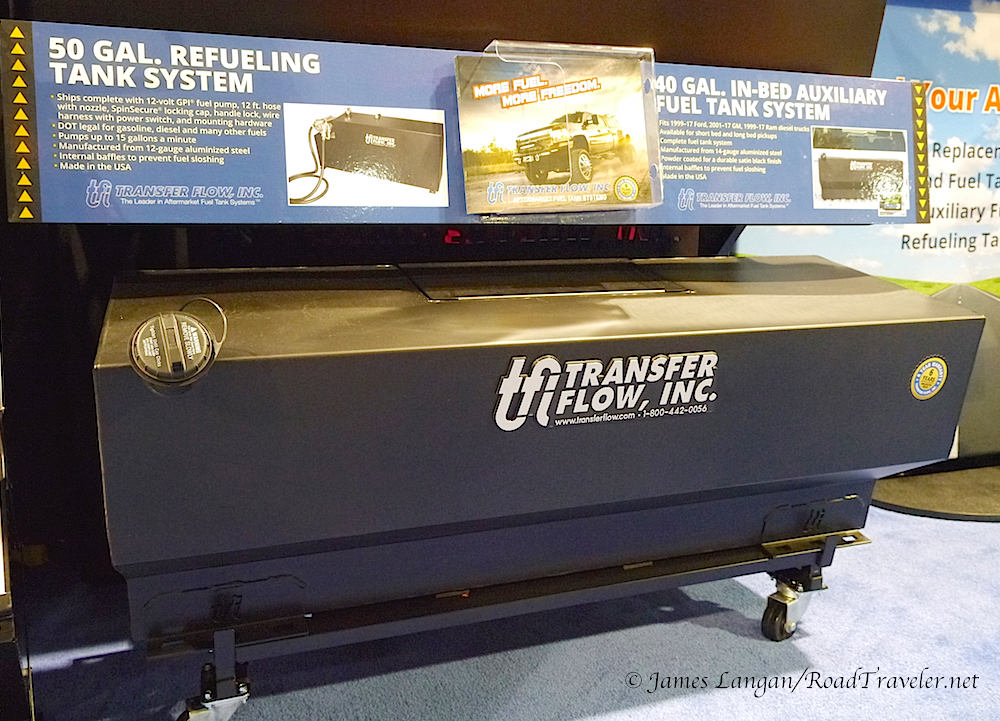
Windows for the pickup shell industry are mostly aluminum-framed products very similar to those used in RVs. They work, but there are some limitations. A.R.E. is raising the bar by installing front and side windows using a new urethane adhesion process. These widows eliminate the frames and screws, provide exceptional sealing, and a seamless integration of tempered automotive glass to the caps. This also means that a local glass shop can replace a broken window easily. A.R.E. is also introducing all-glass rear doors that are contoured to fit modern tailgates, precisely. In early 2017, both the urethane adhesion windows and contoured rear doors will be offered for current trucks and a few recent models. 4are.com
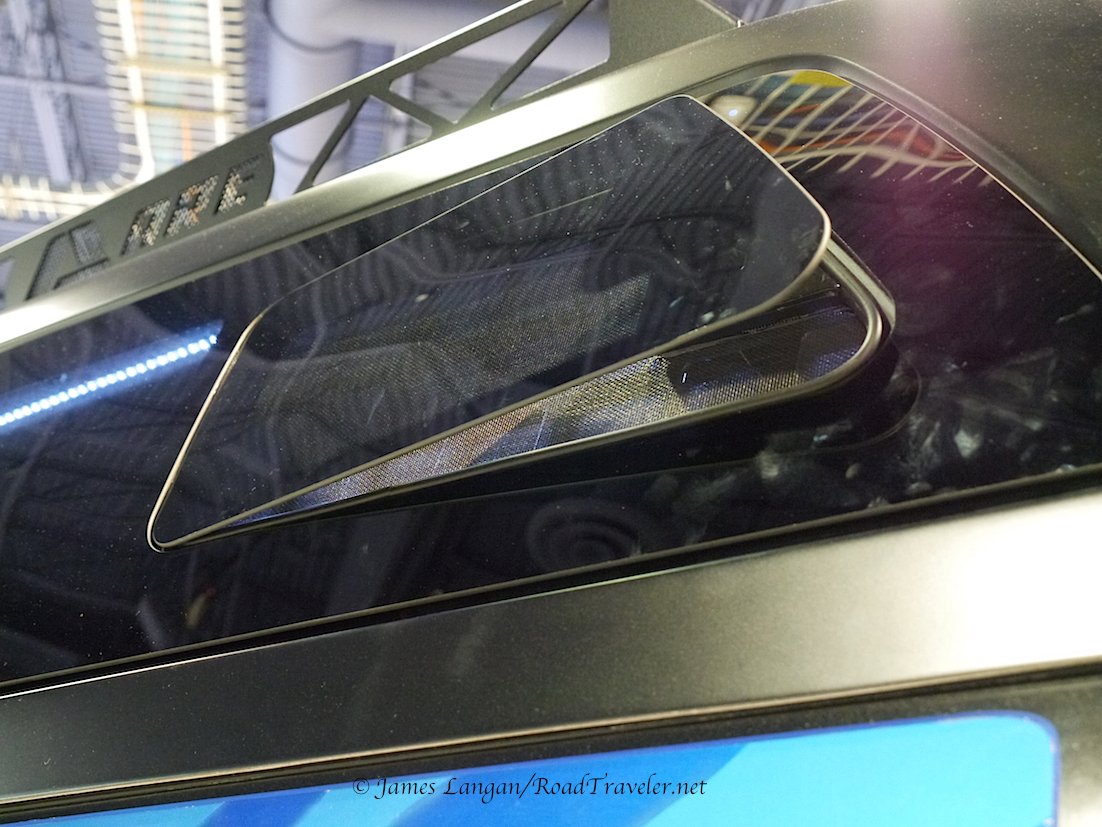
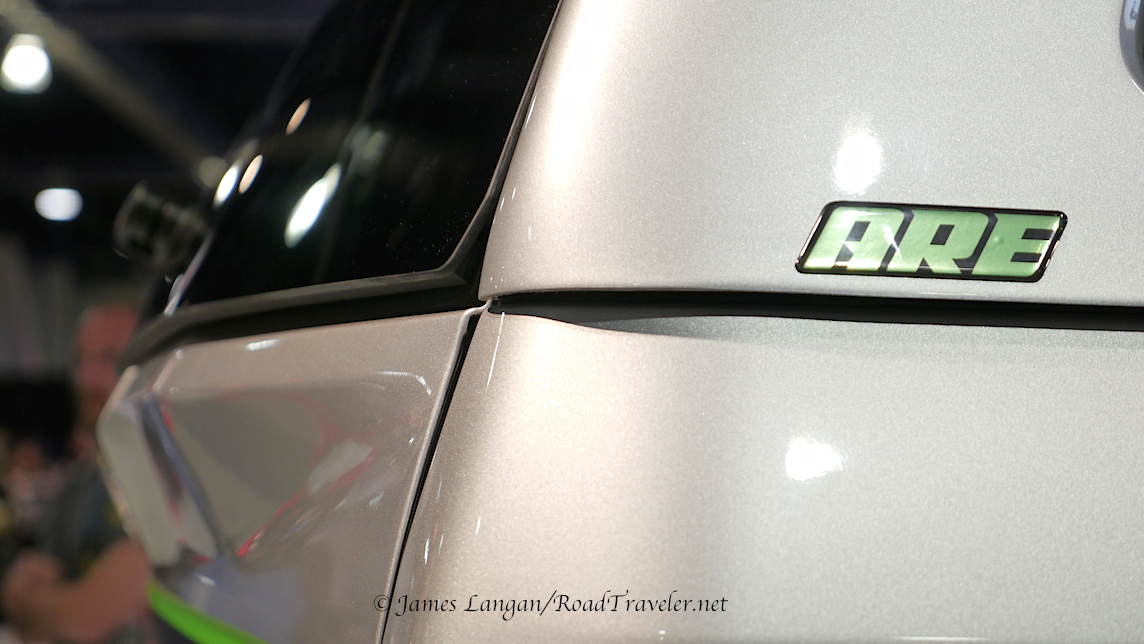
The new ADAPT series from Rigid are capable of adjusting from a wide flood to a spot beam based on vehicle speed. Drivers can also use a dash controller to select eight different beam patterns from 60-degrees to a mere 5-degrees as well as any RGB-W accent light. All this from a single light bar that is available in several lengths. rigidindustries.com
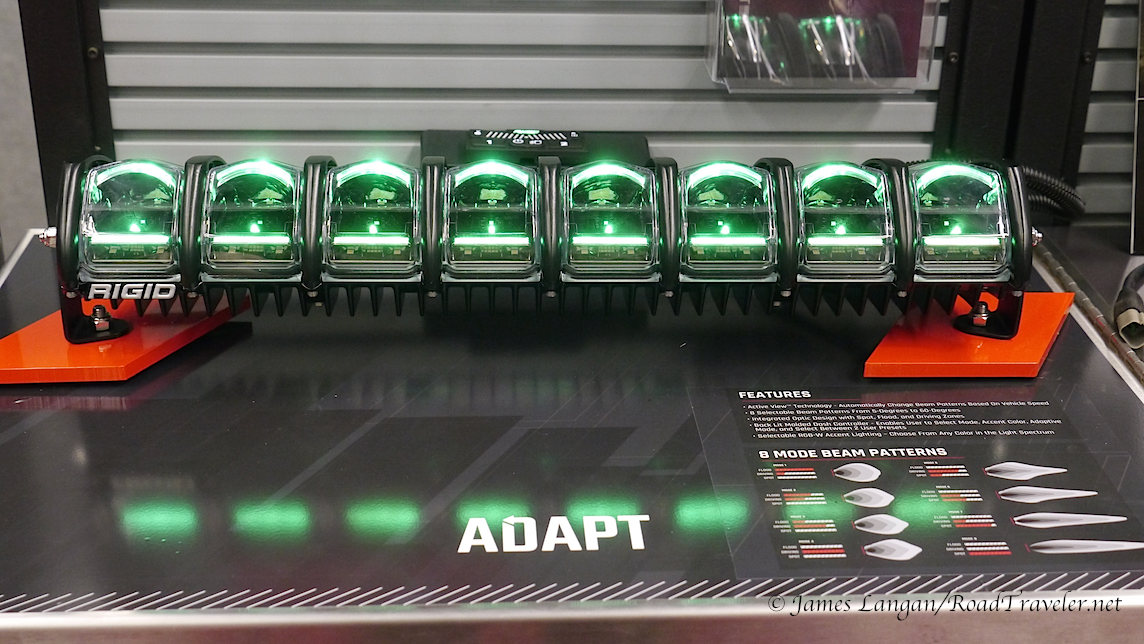
New Baja Guard uses 2” tubular one-piece construction, Made-in-USA, and powder coated black with vehicle-specific mounts for 2014-forward Ram trucks.
O-MEGA II 6” Oval Steps are an updated design featuring T6 aluminum 6” oval steps, vehicle-specific brackets, boards that are trimmed to the desired length, with the stainless-steel step pads (screwed-in) placement as chosen by the owner/installer.
The Tow Guard slides over your receiver, allowing 3/8” thick textured rubber flaps to deflect road debris, protecting your trailer. This 4-month-old product is designed for the most common 2” receiver, but Luverne is working on a version for 2.5” and 3” hitches. luvernetruck.com
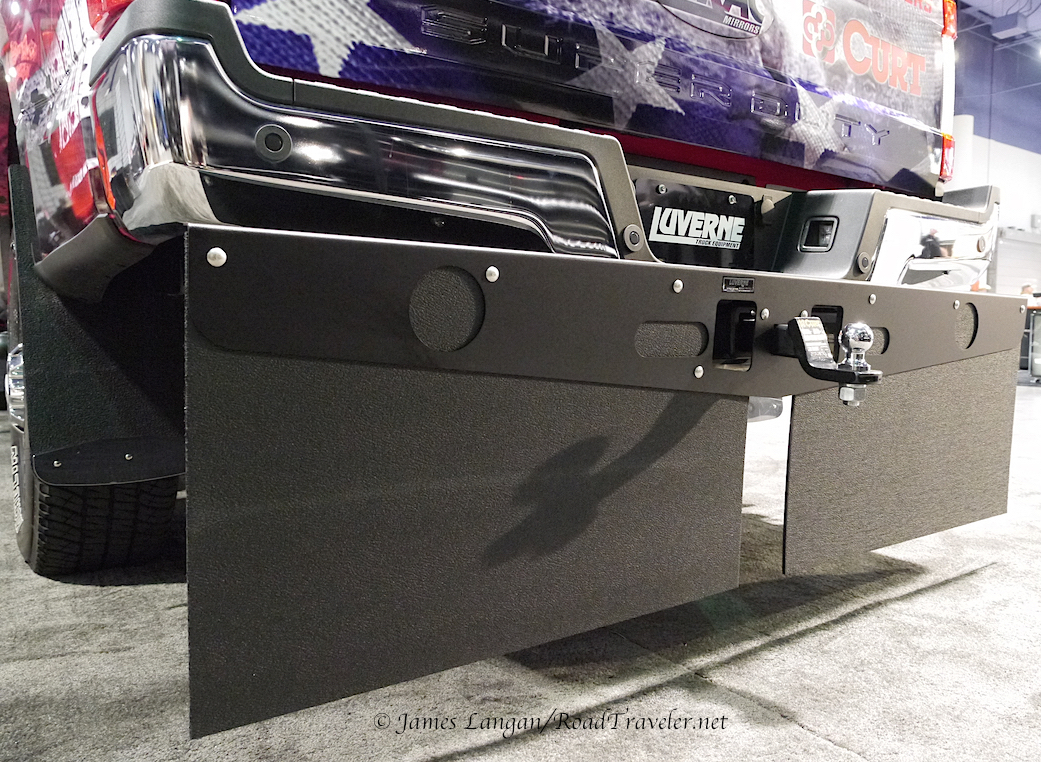
Possibly the most powerful 12-volt compressor I own is an older ExtremeAire from Extreme Outback Products. However, that portable, metal toolbox-mounted version is not the smallest or lightest unit, and Extreme Outback’s new Endura was designed to fit a smaller space while still providing plenty of air for many needs.
The Endura can be permanently mounted (in any orientation), the compressors are waterproof, with a 30-amp motor rated for 1.2 CFM @ 100 psi, and they have a 100% duty-cycle at 70-degrees Fahrenheit. The Endura is ideal for air-suspensions, air-horns, or the occasional tire inflation chore. Single- or dual-compressor portables mounted in stout plastic boxes will also be produced. Like all Extreme Outback Products, the Endura employs only the highest quality fittings and hoses. This is just the latest addition to a complete line of 12-volt automotive compressors and recovery gear from Extreme Outback. extremeoutback.com
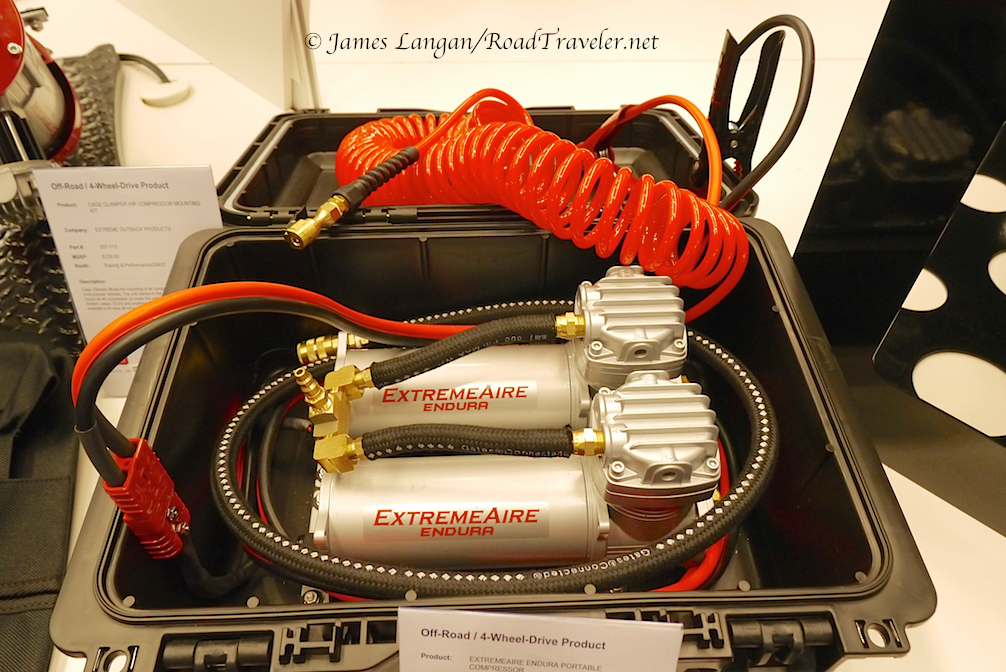
2014 SEMA Show feature in the Turbo Diesel Register Issue 87.
Includes: BD Diesel Performance manifolds, turbos, and differential cover. Legacy Classic Trucks Dodge Carryall and Jeep Scrambler with a 3.0-liter VM Motori turbo diesel. McLeod Workhorse clutch. Cooper Discoverer A/TW winter tire. Dick Cepek Extreme Country mud tire. AEV Ram regular cab flatbed.
COPYRIGHT! ALL MATERIAL PROTECTED BY COPYRIGHT
TDR-SEMA-Issue-87
COPYRIGHT! ALL MATERIAL PROTECTED BY COPYRIGHT